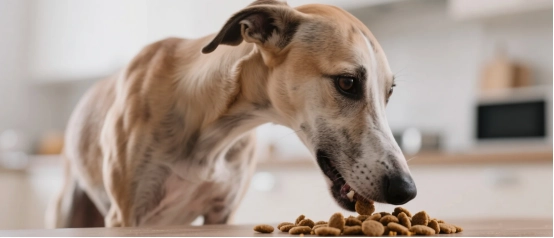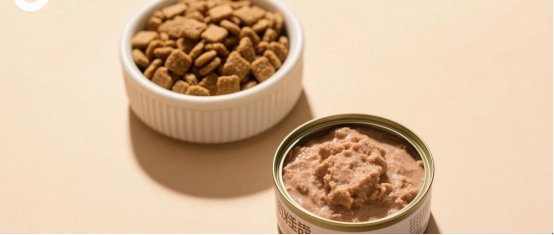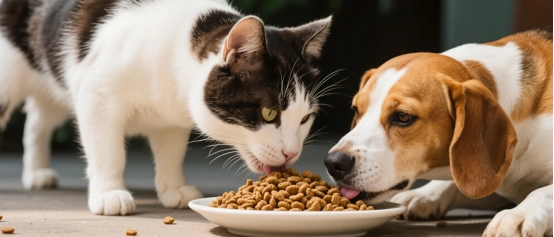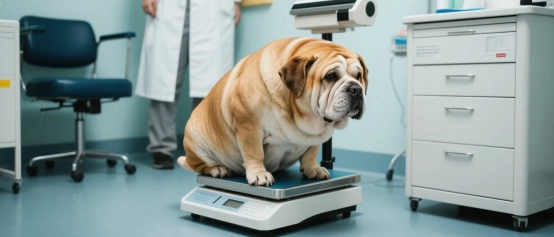
Helping a dog gain weight healthily requires choosing the right dog food, especially for underweight dogs, those in recovery, or those with high energy demands. The right dog food can provide sufficient nutrients to promote weight gain while ensuring overall health. This article explores selecting the best dog food for weight gain from four angles: nutritional needs for weight gain, characteristics of high-quality dog food, considerations when choosing, and practical feeding tips to guide pet owners in making informed decisions.
To gain weight, dogs need to consume more calories than required to maintain their current weight, while ensuring a balanced diet to avoid mere fat accumulation. Protein is the cornerstone of weight gain, with high-quality animal-based proteins (like chicken, beef, or fish) supporting muscle growth and providing essential amino acids for body repair and metabolic health. Ideal dog food should contain 25%-35% protein, prioritizing clearly named animal sources like "chicken" or "deboned salmon" over vague "meat by-products." Fats are the primary calorie source, and premium dog foods should include 15%-20% fat from animal fats or fish oils (like salmon oil), which not only provide high calories but also support skin and coat health. Carbohydrates play a supporting role by supplying additional energy, ideally from digestible grains or vegetables like brown rice or sweet potatoes, rather than low-nutrient fillers like corn. Vitamins and minerals (such as zinc and B vitamins) are crucial for metabolism and appetite, while probiotics or fiber can enhance digestion and nutrient absorption, ensuring dogs utilize nutrients effectively. Understanding these needs is key to selecting dog food suitable for weight gain.
When choosing dog food for weight gain, carefully analyzing the ingredient list and nutritional information is essential. First, focus on high-calorie formulas. Weight gain dog foods typically provide 400-500 kcal per cup or higher, far exceeding standard maintenance foods (around 300-350 kcal/cup). Check the package for calorie content (kcal/kg or kcal/cup) to ensure it meets high-energy needs. Second, prioritize foods with animal-based proteins as the primary ingredients, with the first few listed as specific sources like "chicken" or "lamb," avoiding those heavy in plant proteins or low-quality by-products. Additionally, fat content should be high, but the source matters—Omega-3-rich fish oils are preferable to low-quality plant oils. High-quality dog foods often include digestion-enhancing ingredients like probiotics or fiber, which improve nutrient absorption, especially for underweight dogs with weaker digestive systems. An AAFCO (Association of American Feed Control Officials) statement is a reliable quality indicator, ensuring the food meets nutritional standards. Finally, look for formulas labeled for specific needs, such as "high-performance" or "weight management (gain)," which are often designed for highly active or underweight dogs.
Selecting weight gain dog food requires tailoring choices to your dog's specific circumstances. First, identify the reason for your dog's low weight. Medical conditions (like thyroid issues or parasites), recovery periods (e.g., post-surgery), or high activity levels (e.g., working dogs) may require different types of food. Consult a veterinarian before choosing to rule out health issues and get professional advice. Second, consider your dog's age and size. Puppies need high-protein, high-calorie formulas to support growth, while adult or senior dogs may require moderate calories to avoid excessive fat gain. Size differences also affect calorie needs—small dogs may need denser calorie formulas, while large dogs may require larger portions. Additionally, account for food preferences and potential allergies. For dogs allergic to grains or chicken, opt for grain-free or single-protein formulas (e.g., lamb or duck). Monitoring your dog's response to the food is crucial—high-quality weight gain food should lead to steady weight gain, a shiny coat, and good energy levels. If diarrhea or poor appetite occurs, you may need to adjust the formula or consult a vet.
Proper feeding is key to a successful weight gain plan. First, use the feeding guidelines on the dog food package, factoring in your dog's current and target weight, to calculate daily portions. Typically, calorie intake for weight gain should be 10%-20% higher than for weight maintenance, but increase gradually to avoid digestive strain. For example, add 1/4 cup more food daily and adjust after a week of observation. Dividing the daily amount into 3-4 smaller meals is easier on digestion than one large meal, especially for dogs with small appetites. Second, ensure fresh water is always available, as adequate hydration aids digestion and nutrient absorption. Adding small amounts of wet food or supplements (like fish oil or specialized weight gain powders) can boost palatability and calories, but avoid overdoing it to prevent obesity or nutrient imbalances.
Monitoring weight changes is critical. Weigh your dog weekly, aiming for a steady increase of 0.5%-1% of body weight per week, as rapid gains may lead to fat rather than muscle growth. If weight gain is slow, slightly increase portions or switch to a higher-calorie food. When transitioning to new food, mix it with the old food over 7-10 days to avoid digestive upset. Additionally, moderate exercise (like walks or light play) can stimulate appetite and promote muscle growth, but avoid excessive activity that burns too many calories.
Pet owners often make mistakes when selecting weight gain dog food. First, don't rely solely on increasing portion sizes—low-quality food may lead to malnutrition or obesity rather than healthy weight gain. High-protein, high-fat premium foods are more effective. Second, avoid abrupt food changes or adding too many supplements, which can cause digestive issues. Third, don't overlook overall health—being underweight may signal an underlying condition, and blind weight gain could mask problems. Finally, store dog food properly in airtight containers in a cool, dry place to prevent fat oxidation or spoilage, which can affect palatability and nutrition.
Choosing the best dog food for weight gain involves considering your dog's nutritional needs, the quality of the food's ingredients, individual requirements, and scientific feeding practices. By selecting high-protein, high-calorie formulas, consulting with a vet, and monitoring progress, you can help your dog gain weight healthily while maintaining vitality and overall well-being. Quality dog food is not just a tool for weight gain—it's the foundation of your dog's health. Hopefully, these tips will guide you in finding the right food to help your dog regain health and vigor.





